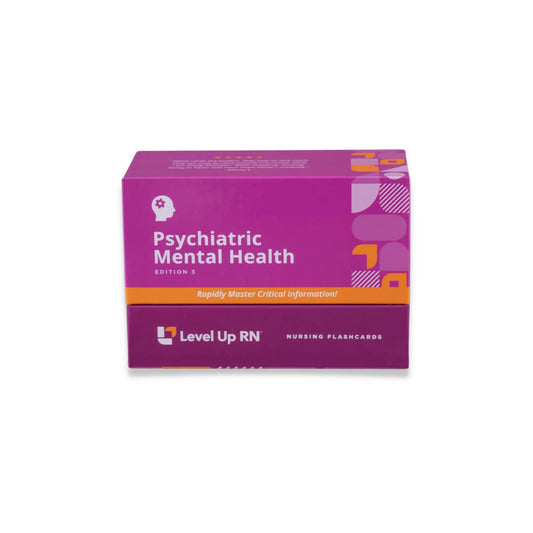Hi, I'm Cathy with Level Up RN. In this video, we are going to talk about somatic symptom disorder as well as factitious disorder. And at the end of the video, I'm going to give you guys a little quiz to test your knowledge of some of the key points I'll be covering. So definitely stay tuned for that. And if you have our Level Up RN psych flashcards, go ahead and pull out your flashcards so you can follow along with me. An individual with somatic symptom disorder will have excessive and persistent thoughts, emotions, and behavior regarding one or more physical symptoms that they have, such as pain. And this preoccupation with symptoms will significantly disrupt the patient's daily life. So, to be clear, the patient isn't faking their symptoms, which is the case with the next disorder we're going to talk about. With somatic symptom disorder, the patient is experiencing symptoms, but their thoughts, behaviors, and emotions regarding these symptoms are excessive and out of proportion. Risk factors associated with this disorder include being female, having a personality disorder, and having a history of childhood neglect.
Somatic symptom disorder is diagnosed when the patient's anxiety and preoccupation with their symptoms last at least six months and cannot be explained by another medical condition. Treatment includes cognitive behavioral therapy as well as medications to treat psychiatric comorbidities such as depression, anxiety, or OCD. As the nurse, you want to acknowledge that the patient's symptoms are real to the patient, but we also want to help the patient see that there are psychosocial factors that are likely contributing to the patient's symptoms. We also want to help our patient develop coping strategies. And then it's important for loved ones to spend time with the patient, particularly when the patient is not having symptoms, so we aren't reinforcing the idea that symptoms bring special attention from others.
Moving on to factitious disorder, which is also known as Munchausen syndrome. With this disorder, the individual exaggerates, fakes, or induces physical symptoms or psychological symptoms in order to get attention. This is different than malingering, which is where the individual fakes symptoms in order to get money or get out of work. Signs that may be present in a patient who has factitious disorder include an extensive medical history, inconsistencies between the patient's symptoms and the exam findings, and a reluctance on the part of the patient to release their medical records. Diagnosis of factitious disorder is extremely difficult, so this disorder would be diagnosed when there is evidence of deceptive behavior. For example, if a patient is coming in with complaints of chronic diarrhea but a stool sample is positive for laxatives, then that would be evidence of deceptive behavior. Treatment of factitious disorder includes talk therapy as well as medications to treat psychiatric comorbidities.
All right. It's quiz time, and I've got three true or false questions for you. Question number one. With somatic symptom disorder, the patient's symptoms are not real. True or false? The answer is false. With this disorder, the patient's symptoms are real, but their preoccupation with their symptoms is excessive and out of proportion. Question number two. Factitious disorder is feigning symptoms for monetary gain. True or false? The answer is false. Malingering is feigning symptoms for monetary gain. Question number three. Signs of factitious disorder often include inconsistencies between the patient's reported symptoms and exam findings. True or false? The answer is true. All right. That is it for this video. I hope you found it helpful. Take care, and thank you so much for watching.


